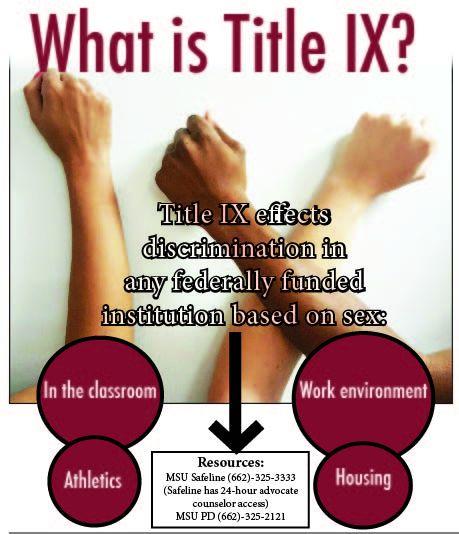This semester Mississippi State University is increasing enforcement of education and awareness on sexual misconduct policies in connection with non-discrimination policy umbrella, Title IX.
Since 1972, there has been a non-discrimination policy on the basis of sex known as Title IX. According to the Department of Justice, “Title IX is a comprehensive federal law that prohibits discrimination on the basis of sex in any federally funded education program or activity.” In 2011, the Office of Civil Rights (OCR) made a push for Title IX awareness across the country in every educational system that receives federal assistance. This push set off nationwide awareness of student and faculty rights regarding sexual assault and misconduct. Over the last four years, universities have been investigated and penalized for noncompliance with this policy. Ivy League institutions such as Harvard and Yale along with local universities in the surrounding states have been investigated for violating Title IX guidelines.
Due to the push by the OCR and desire to keep the integrity of the university at its highest, MSU has created a new set of sexual misconduct guidelines and hired a Title IX coordinator. Also this semester, the university required every syllabus to include Title IX policies.
In November 2014, MSU hired Brett Harvey to oversee incidents of sexual misconduct and Title IX compliance throughout the university. Harvey said he has worked with university officials, including President Mark Keenum, to create new guidelines and policies for sexual misconduct and provide support for students and faculty who have been discriminated against, harassed or assaulted.
“Education is the key to raising awareness across campus,” Harvey said. “I know that some people have heard our message two or three times, but I don’t apologize for that. There really is no downside to repeating this message.”
The new policy outlines the definition of sexual misconduct, the definition of consent, the steps to take in reporting sexual misconduct and many other important elements including resources for students, faculty and staff.
Leah Pylate, assistant director of health promotion and wellness and sexual assault, said she works with outreach and education throughout campus.
She also detailed information regarding the new Safeline and many resources available to students through the Longest Student Health Center on campus.
“ By calling the MSU Safeline at 662-325-3333, students can access a counselor 24 hours a day and receive the support they need,” Pylate said via email. “Student Counseling Services offers advocacy for students needing this service. Advocates can assist in many ways, including obtaining counseling or medical care, reporting to the university, obtaining housing or academic accommodations or transportation to the police station or hospital.”
With the new policy in place, education on sexual misconduct is being enforced at MSU. Along with faculty and staff, resident advisors for the university have been given the knowledge of what to do when situations occur within residents halls or to residents. This year, incoming freshmen were required to take a Haven training course online that outlined their rights as students on campus and educated them on what is and is not sexual misconduct and sexual assault. The student health center is also collaborating with other departments to improve victim services, educational efforts and prevention work.
Categories:
MSU pushes sexual misconduct policies
Bailey McDaniel
•
September 10, 2015

Title IX
0
Donate to The Reflector
Your donation will support the student journalists of Mississippi State University. Your contribution will allow us to purchase equipment and cover our annual website hosting costs.
More to Discover







